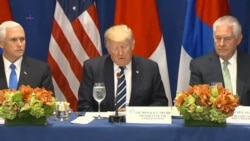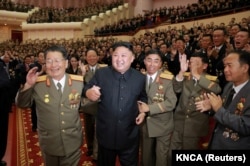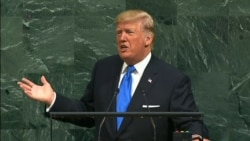U.S. President Donald Trump imposed new economic sanctions Thursday against North Korea for its nuclear threat, targeting individuals and businesses that finance trade with Pyongyang’s reclusive communist regime and fund its weapons development.
The U.S. leader called North Korea’s nuclear bomb and ballistic missile programs “a grave threat to peace and security in our world, and it is unacceptable that others financially support this criminal rogue regime. The brutal North Korea regime does not respect its own citizens, or the sovereignty of other nations.”
At the same time, Trump said China’s central bank has ordered a halt to trading with North Korea, although there was no immediate confirmation from Beijing, which long has been Pyongyang’s main trade partner and its economic lifeline. Trump, who long has sought China’s help in reining in North Korean weapons development, praised the Beijing move.
WATCH: Trump on new executive order
Targets individuals, goods
Trump said the new U.S. sanctions give the U.S. Treasury Department authority “to target any individual or entity that conducts significant trade in goods, services or technology with North Korea.”
He said U.S. officials would “identify new industries, including textiles, fishing, information technology, and manufacturing, that the Treasury Department can target with strong sanctions” and measures to “prevent sanctions evasion.”
The president said the new measures are aimed at disrupting “critical North Korean shipping and trade networks. For much too long, North Korea has been allowed to abuse the international financial system to facilitate funding for its nuclear weapons and missile programs.”
He said the United States “has had representatives working on this problem for over 25 years, they have done nothing. That’s why we’re in the problem that we’re in today, in addition to, frankly, other countries not doing what they should have done.”
Trump made the announcement alongside South Korean President Moon Jae-in and Japanese Prime Minister Shinzo Abe, both of whom praised the U.S. action as they met in New York on the sidelines of the annual U.N. General Assembly.
Trump imposed the sanctions two days after he mocked North Korean leader Kim Jong Un in a speech at the U.N. as “rocket man” for his missile tests, and said the U.S. would “totally destroy North Korea” if it attacks the United States or its allies.
WATCH: Trump warns North Korean leader
Kim responded Thursday, calling president Trump “mentally deranged,” adding “a frightened dog barks louder,” in comments provided by the official state news agency, KCNA.
“His remarks which described the U.S. option through straightforward expression of his will have convinced me, rather than frightening or stopping me, that the path I chose is correct and that it is the one I have to follow to the last,” Kim said.
At the United Nations
In his speech to Thursday’s U.N. General Assembly session, South Korean President Moon said, “We do not desire the collapse of North Korea. We will not seek reunification by absorption or artificial means.”
Moon called on Pyongyang to immediately cease “making reckless choices” and choose the path of dialogue.
“I urge North Korea to abandon its hostile policies against other countries and give up its nuclear weapons program in a verifiable and irreversible way,” the South Korean leader said.
He called on the international community to “strongly and sternly” respond until North Korea ends its nuclear weapons development.
Tillerson: Give up nuclear ambitions
Later, at a special high-level session of the U.N. Security Council on proliferation called by the United States, Secretary of State Rex Tillerson urged North Korea to give up its nuclear ambitions. He cited the success of a small group of countries that voluntarily relinquished their arsenals, including current council members Kazakhstan and Ukraine.
“By rejecting the power of nuclear weapons, both of these two proud nations are in a better place than they would have been otherwise,” Tillerson said.
He said that while North Korea may assume nuclear power will enhance the regime’s prestige and assure its survival, they would only lead to greater isolation, shame and deprivation.
“Continued threats against us, the U.S., and now the entire global community will not create safety for the regime, but will rather stiffen our collective resolve and our commitment to deterring North Korean aggression,” he said.
Tillerson also urged China to put pressure on Pyongyang to change its strategic calculation “before it’s too late.”
“Cooperation from China is also essential if the international community is to bring North Korean nuclear and missile threats under control and prevent a catastrophic spiraling of instability and conflict on the Korean Peninsula,” the secretary said.
'No bright future'
“No bright future awaits North Korea if it continues on its present path and its isolation from the world continues,” Japanese Foreign Minister Taro Kono told the council.
“It is necessary to exercise pressure, as appropriate, if countries blatantly violate international nonproliferation rules,” Chinese Foreign Minister Wang Yi said, without mentioning North Korea by name. “But sanctions are not a panacea; dialogue and negotiation present the fundamental way out,” he added, warning confrontation and sanctions alone can lead to the escalation and spillover of conflicts.
The Security Council has adopted a series of economic sanctions against North Korea, but so far they have not kept Kim from continuing the weapons tests, including the country’s sixth and largest nuclear test earlier this month.








